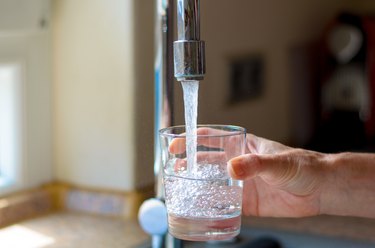
Water is an essential substance that women (and all people) need to consume in sufficient quantities every day. You have probably heard about some of the benefits of drinking water, but how much do you really need? In many cases, if you drink when you are thirsty, you'll get enough water each day.
Tip
The recommended daily fluid consumption for women is about 11.5 cups (2.7 liters) each day but will vary based on a number of factors. This should ideally all come from pure water, but can include water in many forms.
Video of the Day
Benefits of Drinking Water
There are several potential health benefits that can accrue just from drinking water. Water is essential for the proper functioning of every cell, tissue and organ in your body. According to the Mayo Clinic, water can help with:
Video of the Day
- Regulating temperatures
- Protecting sensitive tissues
- Expelling waste
- Lubricating and cushioning joints
If you become dehydrated, the dehydration can have a negative impact on your health. Even if you are only slightly dehydrated, you may notice that you become sluggish or lack energy. According to the Mayo Clinic, some potential signs of dehydration include dry mouth or tongue, extreme thirst, dizziness, confusion, dark urine and less-frequent urination.
You're more likely to become dehydrated if you have been sweating heavily due to heat, exercise or a fever. You can also experience dehydration as the result of a stomach virus or any illness or issue that can cause vomiting or diarrhea, as well as from chronic illnesses like diabetes.
What Influences Your Needs?
Women and men don't necessarily need the same amounts of water due to differences in their sizes. However, other factors can influence how much water you need.
The amount you exercise can affect how much water you need. If you exercise frequently and get very sweaty, you'll need to drink more water to compensate for the loss of water through sweat. Similarly, if you live in a hot, dry environment, you are more likely to need more water.
In some cases, medical conditions can influence how much water you need to stay hydrated. For example, if you have diarrhea or you are vomiting frequently, you will need additional liquid to stay hydrated.
Finally, if you are pregnant or breast feeding, your water needs will vary. According to the Office on Women's Health, when you are pregnant, you should drink about 10 cups (2.4 liters) of fluids each day, 13 cups (3.1 liters) daily if you're breastfeeding. This can be from regular water or from other sources such as juices, teas and other nonalcoholic beverages.
Read more: Ginger Water Benefits
Daily Drinking Water Needs
According to the Mayo Clinic, the common concept of needing 8 cups of water each day may not be 100 percent accurate. Instead, they suggest that you are likely able to get enough water through the simple act of always satisfying your thirst. Also, keep in mind that you get about 20 percent of your daily fluid needs from the foods that you eat, so only about 80 percent has to come from various drinks.
An older report by the National Academies of Sciences, Engineering and Medicine , still cited by the Centers for Disease Control and Prevention and the Mayo Clinic, recommends the following:
- Men should consume about 15.5 cups (3.7 liters) of fluids each day.
- Women should consume about 11.5 cups (2.7 liters) of fluids each day.
Keep in mind that these are recommendations, not requirements. Your needs may vary, based on your health, your pregnancy status, your climate and your level of physical activity. If you are concerned that you are not getting enough water, you can download a water-calculator app for your smart phone or other device and track your intake digitally.
If you are not getting enough fluids, you could also try drinks infused with other ingredients. For example, ginger water can help you stay hydrated and has more flavor than plain water. You may also want to experiment with drinking warm or cold water, based on which tastes better to you. Finally, you might want to try decaffeinated teas or other drinks to help keep your liquid consumption rates up.
- Mayo Clinic: "Dehydration"
- Mayo Clinic: "Water: How Much Should You Drink Every Day?"
- Office on Women's Health: "Staying Healthy and Safe"
- Centers for Disease Control and Prevention: "Get the Facts: Drinking Water and Intake"
- National Academies of Sciences, Engineering and Medicine: "Dietary Reference Intakes: Water, Potassium, Sodium, Chloride, and Sulfate"